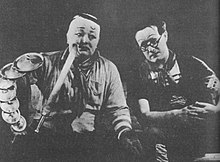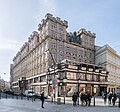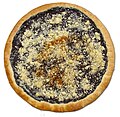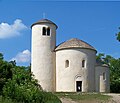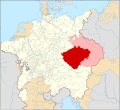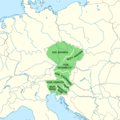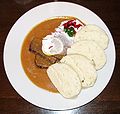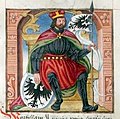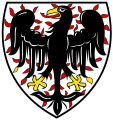Portal:Czech Republic
Welcome to the Czech Portal!
Vítejte na Českém portálu!

|

|

| |
The Czech Republic, also known as Czechia, and historically known as Bohemia, is a landlocked country in Central Europe. The country is bordered by Austria to the south, Germany to the west, Poland to the northeast, and Slovakia to the southeast. The Czech Republic has a hilly landscape that covers an area of 78,871 square kilometers (30,452 sq mi) with a mostly temperate continental and oceanic climate. The capital and largest city is Prague; other major cities and urban areas include Brno, Ostrava, Plzeň and Liberec.
The Duchy of Bohemia was founded in the late 9th century under Great Moravia. It was formally recognized as an Imperial Estate of the Holy Roman Empire in 1002 and became a kingdom in 1198. Following the Battle of Mohács in 1526, all of the Lands of the Bohemian Crown were gradually integrated into the Habsburg monarchy. Nearly a hundred years later, the Protestant Bohemian Revolt led to the Thirty Years' War. After the Battle of White Mountain, the Habsburgs consolidated their rule. With the dissolution of the Holy Roman Empire in 1806, the Crown lands became part of the Austrian Empire.
In the 19th century, the Czech lands became more industrialized; further, in 1918, most of the country became part of the First Czechoslovak Republic following the collapse of Austria-Hungary after World War I. Czechoslovakia was the only country in Central and Eastern Europe to remain a parliamentary democracy during the entirety of the interwar period. After the Munich Agreement in 1938, Nazi Germany systematically took control over the Czech lands. Czechoslovakia was restored in 1945 and three years later became an Eastern Bloc communist state following a coup d'état in 1948. Attempts to liberalize the government and economy were suppressed by a Soviet-led invasion of the country during the Prague Spring in 1968. In November 1989, the Velvet Revolution ended communist rule in the country and restored democracy. On 31 December 1992, Czechoslovakia was peacefully dissolved, with its constituent states becoming the independent states of the Czech Republic and Slovakia.
The Czech Republic is a unitary parliamentary republic and developed country with an advanced, high-income social market economy. It is a welfare state with a European social model, universal health care and free-tuition university education. It ranks 32nd in the Human Development Index. The Czech Republic is a member of the United Nations, NATO, the European Union, the OECD, the OSCE, the Council of Europe and the Visegrád Group. (Full article...)
Selected article -
Osvobozené divadlo (1926–1938) (Liberated Theatre or Prague Free Theatre) was a Prague avant-garde theatre scene founded as the theatre section of an association of Czech avant-garde artists Devětsil (Butterbur) in 1926. The theatre's beginnings were strongly influenced by Dadaism and Futurism, later by Poetism (a specific Czech art movement). The theatre was very leftist oriented, but it could also be critical of the Communists. One of the founders, Jiří Frejka, came up with the name in 1926. In the theatre both authorial plays and works by well-established modern authors; such as G. Apollinaire, A. Jarry, J. Cocteau, A. Breton, F. T. Marinetti, and V. Nezval were performed. The modern conception of the scene also laid more emphasis on lighting and the theatrical conception adjured more cooperation and contacts between actors and audience. (Full article...)
Selected picture

Source: Národní Galerie v Praze, PD
In this month
- 11 December 1949 – The Číhošť miracle takes place: during a church service of Josef Toufar in the village of Číhošť, the crucifix moves several times over the pulpit, prompting an intervention by the StB
- 15 December 1230 – Wenceslaus I succeeds Ottokar I as King of Bohemia
- 16 December 1992 – The Czech National Council adopts the Constitution of the Czech Republic
- 18 December 1935 – Edvard Beneš is elected second President of Czechoslovakia
- 22 December 1966 – Construction begins on the Stalin Monument (pictured), the largest representation of Stalin in the world
Categories
Selected biography -
Dominik Hašek (Czech pronunciation: [ˈdomɪnɪk ˈɦaʃɛk], audio; born January 29, 1965) is a Czech former ice hockey goaltender who mostly played for the Buffalo Sabres of the National Hockey League (NHL). Widely regarded as one of the best goaltenders of all time, Hašek also played for the Chicago Blackhawks, Detroit Red Wings, and Ottawa Senators in his 16-season National Hockey League (NHL) career before finishing his career in Europe. While in Buffalo, he became one of the league's finest goaltenders, earning him the nickname "The Dominator". His strong play has been credited with establishing European goaltenders in a league previously dominated by North Americans. He is a two-time Stanley Cup champion, both with the Red Wings, winning his first one as the starting goaltender, and his second one as the backup goaltender.
Hašek was one of the league's most successful goaltenders of the 1990s and early 2000s. From 1993 to 2001, he won six Vezina Trophies, the most under the award's current system of voting for the best individual goaltender. In 1998 he won his second consecutive Hart Memorial Trophy, becoming the first goaltender to win the award multiple times. During the 1998 Winter Olympics in Nagano, Japan, he led the Czech national ice hockey team to its first and only Olympic gold medal. The feat made him a popular figure in his home country and prompted hockey legend Wayne Gretzky to call him "the best player in the game". While with the Red Wings in 2002, Hašek became the first European-trained starting goaltender to win the Stanley Cup. In the process, he set a record for shutouts in a postseason year. (Full article...)
Did you know?

- ...that the Holy Trinity Column in Olomouc was inscribed on the World Heritage List as "one of the most exceptional examples of the apogee of Central European Baroque artistic expression"?
- ... that the leftist Czechoslovak Chemical Workers' Union was expelled from the OSČ trade union centre in 1922?
- ... that Jan Maroši scored directly from a corner for Sigma Olomouc in a 1992–93 UEFA Cup match against Juventus?
- ... that Miroslav Tyrš, the founder of Czech national sport movement Sokol, was born into a German family?
General images
Related portals
Topics

Czech lands: Bohemia • Moravia • Czech Silesia
History: Únětice culture • Boii • Marcomanni • Samo • Great Moravia • Přemyslid dynasty • Lands of the Bohemian Crown • Czech lands (1526–1648) • 1648–1867 • 1867–1918) • Czechoslovakia • Czech Republic
Geography: Lakes • Protected areas • Regions • Rivers
Law: Judiciary • Law enforcement • Supreme Court of the Czech Republic
Politics: Administrative divisions • Government • Constitution • Elections • Foreign relations • Army • Parliament • Political parties • President • Prime Minister
Economy: Banks • Czech koruna • Energy • Oil and gas deposits • Stock Exchange • Tourism • Transport
Culture: Architecture • Art • Cinema • Cuisine • Demographics • Education • Language • Literature • Media • Music • Philosophy • Prostitution • Public holidays • Religion • Sport • Television • Video games
Symbols: Flag • Coat of arms • National anthem (Kde domov můj)
Lists: Outline of the Czech Republic • List of Czech Republic–related topics
WikiProjects
Featured and good content
Things to do
Wikimedia
The following Wikimedia Foundation sister projects provide more on this subject:
-
Commons
Free media repository -
Wikibooks
Free textbooks and manuals -
Wikidata
Free knowledge base -
Wikinews
Free-content news -
Wikiquote
Collection of quotations -
Wikisource
Free-content library -
Wikiversity
Free learning tools -
Wikivoyage
Free travel guide -
Wiktionary
Dictionary and thesaurus


